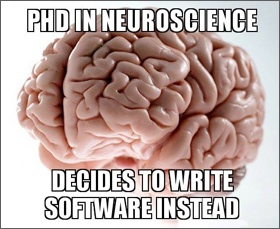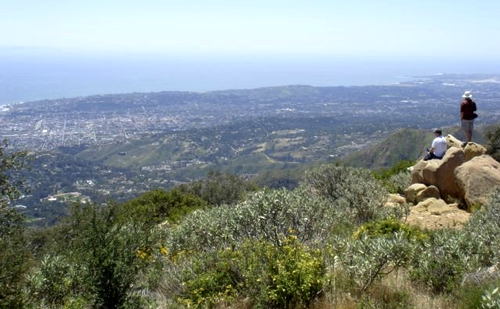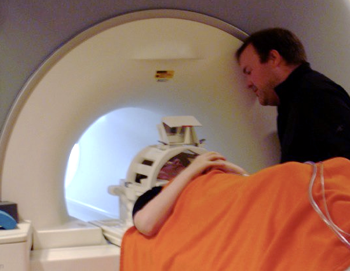Adiós Academia

You may have noticed that I haven’t posted anything of neuro-subtance since, oh, January 2012.
Well, between you and me, there is a perfectly good reason why that is the case.
That was about the time I completed the paperwork to end my neuroscience career and begin a new adventure in private industry as a software engineer.
Wait, what?
The short version is that my wife and I have decided to make Santa Barbara, California our permanent home. Given that the postdoc is a temporary position usually lasting less than five years, the time was coming soon to move on up to being a professor or move on out of academia. After much deliberation, I have chosen the latter.
I opted not to announce the transition publicly for some time in case I changed my mind, or if the new position didn’t work out. I figured I could always head back to research as long as nobody noticed I had temporarily left. Now, here we are, almost two years later and I have neglected to let you, my closest internet-friends, in on the big news. How terrible!
Some important factors in the decision:
(a) Funding. There were plans afoot for me to make the transition from postdoctoral researcher to research faculty. This would have potentially kept the lights on in the Bennett household for many years to come. I easily could have enjoyed a long career focused uniquely on research in cognitive neuroscience. The only risk? Funding. Funding rates have been dropping year over year for decades. The average age at which a new investigator finally gets their first R01 grant has risen to 43+. The percent of funded research project grants has fallen from 32% in 1999 to 24% in 2007. The success rate for funding on your first grant submission is now 12%. [see Broken-Pipeline.pdf]
It’s not that I can’t handle the continuous funding chase, but it is a bitter struggle. The situation isn’t getting better either. Would you want to place a bet on whether success rates are going to fall below 20% or rise back to 30% as we move forward? Further, if a grant falls through, and there happens to be a gap in funding coverage, then my paycheck would simply cease to exist. Working for a private employer may be ‘at will’ employment, but the chances of a negative outcome may be far lower than rolling the dice with the NIH, NSF, or other funding agency every few years.
The lab that I was working in experienced just such a shortfall this last year as the federal sequester hit the campus. The lab was funded primarily by funds that, filtered through other agencies, came from the U.S. Army. When the sequester arrived, lab funding took a double-digit drop. My postdoc advisor was hard pressed to pay people’s salaries. Data acquisition stopped and everyone just had to hope that they had enough quality data to publish/graduate. That is a scary proposition.
(c) Compensation. The postdoctoral researcher is seen as a training position where you are learning important new skills and scientific perspectives from the principal investigator that you work for. Based on the salary data I collected as part of my job search, postdocs are typically getting paid a (literal) fraction of their value in private industry. This, again, tends to get better when you become an assistant professor, but it can take a while to climb the ladder. I would have received a bit of a bump if I would have gone into a research faculty position, but it paled in comparison to the, um, significant increase I negotiated as part of my new software development position.
(b) Lifestyle. Part and parcel of academia is the fact that everyone is constantly moving around. Your best friend today may or may not be in the same town with you next year. While this stabilizes a bit when/if you finally land that coveted assistant professor position, the time leading up to that point is defined by flittering around the country. First you head off to grad school, then off to a postdoc, then to who knows where. I know some individuals who are on their fourth city in ten years, with another move on the way. For some this is exhilarating, as you are essentially getting paid to see the world. For me it has been harder, constantly making incredible friends and then having to say goodbye. I now have friends stretching from Washington, to Maine, to Florida, and back to California. It was finally time to stop flying around and put down some roots.
The other lifestyle point is that my wife and I have really fallen in love with Santa Barbara, California. The weather is amazing. We are able to live two blocks from the beach and an eight minute drive to hiking in the mountains. I am able to commute by bike almost every day of the year. These geographical and climate features are fantastic, but beyond that is the fact that we have met some amazing people in Santa Barbara, and it just feels like home now. I don’t want to say goodbye, and now I don’t have to.

Things aren’t all bad as a postdoc, however. I would be remiss if I didn’t highlight some incredible benefits of the old job:
(a) Schedule. Being able to set your own schedule is an incredible benefit of the postdoc. I am a nightowl by nature, so working 10am-6pm with another hour or two of reading in the late evening suited me perfectly. Working an 8-5pm job is not really my cup of tea. The flexibility to take time away from work was also fantastic as a postdoc. I had some genuinely awesome travel and volunteer experiences that I might have never experienced in a regular job, including trips to Hawaii and several excursions to Europe. Now I have to hoard my ATO days like they are bars of gold.
(b) People. I have met some of the most genuinely awesome people in my years as a researcher. There is something truly magical about a group of people who have similar interests and come together for a common cause. I found that special kinship in graduate school, my postdoc, and also with the larger community of cognitive neuroscientists. Even though I am leaving neuroscience professionally, I will always identify with this cadre of individuals who brand themselves ‘neuroscience geeks’. While there is some of this kinship in my new position, there is an overriding sense that many folks are just punching the clock.
(c) Academic Freedom. You are at the mercy of your postdoctoral advisor to a point, but at the end of the day you have an awesome job where, for all intents and purposes, you are getting paid to think. How absolutely freaking incredible is that? You know that one thing that you are most curious about? Here is some money to learn everything you can about that one thing and then here is some more money to find out the answers to questions we don’t even know to ask yet. I won’t lie to you – I miss it all. Frequently.

So, what am I doing now?
Well, I am working for a small scientific instrumentation company in Goleta, California that goes by the name [redacted]. Well, I could tell you their name, but I would need to obtain prior approval from my corporate overlords (no joke). I work as a firmware engineer in the software group, helping to maintain the embedded applications that drive the instruments. As a neuroscientist, the best part of my week was spending an entire afternoon writing a gnarly MATLAB script. Now, I get to do that every day. I could not have hoped for a better place to end up after falling out of the Ivory Tower.
I have had a really, really great run as a professional neuroscience researcher. Great friends. Great research. Amazing conferences. Deep debates on the nature of of the brain and cognition. An Ig Nobel award! I credit any success I might have had to the wonderful mentors who took me under their wing, and to the long list of quality people I have encountered on my academic journey. I love cognitive neuroscience and scientific exploration more than I can adequately put into words. Still, I was not content to let the sunk costs of a graduate education dictate my future actions, especially when other options are now a better fit for my personal and professional goals.
~Craig [Prefrontal]

One Response to “Adiós Academia”
practiCal fMRI - November 11th, 2013
Good luck, Craig! It sounds to me like a solid, well-reasoned decision and I think you are doing the right thing. Besides, you’ll be surprised at how relatively easy it is to remain involved in science from your new position. You’re only one degree of separation away from “formal” academia (while being several degrees of separation from all the crap!). Up here in the Bay Area a number of PhDs are making similar geographic decisions and moving to social media companies where their modeling and stats skills are well compensated. It’s a growing trend, and my personal opinion is that it’s no bad thing.
Leave a Reply
You must be logged in to post a comment.